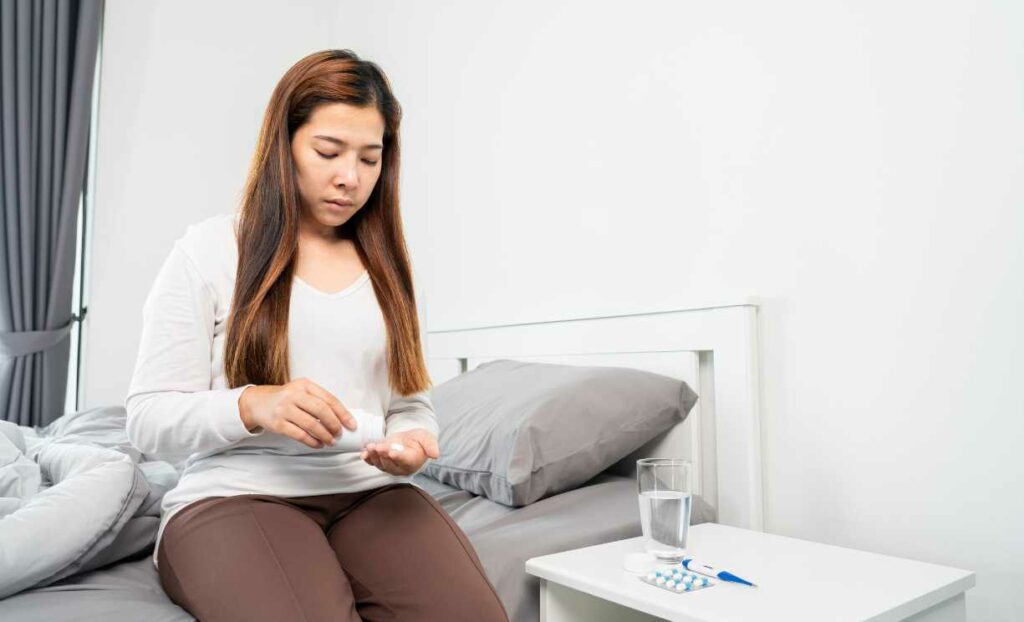Polycystic Ovary Syndrome (PCOS) is a common hormonal disorder that affects individuals of reproductive age, often accompanied by a range of symptoms. Among the challenges associated with PCOS, anxiety can be a significant and pervasive issue. Managing PCOS-related anxiety requires a comprehensive approach that may include lifestyle changes, therapy, and in some cases, medication. In this blog, we’ll delve into the intersection of PCOS and anxiety, exploring various medication options that individuals may consider in consultation with their healthcare providers.
Contents
Understanding PCOS And Anxiety
Polycystic Ovary Syndrome (PCOS) is a common health condition that affects the hormonal balance in women’s bodies. Alongside physical symptoms like irregular periods and cysts on the ovaries, many individuals with PCOS also experience anxiety. Anxiety in PCOS can be influenced by hormonal changes, concerns about fertility, and challenges in managing weight. It’s like having a double burden—dealing with the physical aspects of PCOS and facing emotional struggles related to anxiety.
The hormonal imbalances in PCOS can contribute to feeling anxious, worried, or stressed. It’s essential to recognize that the emotional impact of PCOS is as significant as the physical, and seeking support from healthcare professionals is crucial to finding effective ways to manage both aspects of this condition.
Medication Options For PCOS-Related Anxiety
When it comes to managing anxiety related to Polycystic Ovary Syndrome (PCOS), healthcare providers may consider various medication options based on individual needs. Some common medication choices include:
- Selective Serotonin Reuptake Inhibitors (SSRIs): SSRIs, like fluoxetine and sertraline, are often prescribed for anxiety. They work by increasing serotonin levels in the brain, helping to regulate mood.
- Benzodiazepines: Benzodiazepines such as lorazepam and clonazepam may be used for short-term relief of acute anxiety symptoms. However, they are typically used with caution due to the risk of dependence.
- Beta-Blockers: Beta-blockers like propranolol might be considered to address physical symptoms of anxiety, such as a rapid heart rate. They are not usually the primary treatment but can be adjunctive in specific situations.
- Antidepressants: Tricyclic antidepressants or other classes of antidepressants may be prescribed when anxiety coexists with depression. These medications can have dual effects on mood and anxiety symptoms.
- Hormonal Birth Control: Hormonal birth control methods, including combination oral contraceptives, might be recommended. These can help regulate menstrual cycles and manage symptoms, contributing to overall well-being.
- Anti-Androgen Medications: Medications like spironolactone, which has anti-androgen properties, may be used to address symptoms related to elevated androgen levels in PCOS. These can indirectly affect mood and anxiety.
It’s important for individuals to discuss their specific symptoms and medical history with their healthcare providers to determine the most appropriate medication and treatment plan. Additionally, lifestyle changes, therapy, and other non-pharmacological approaches may be part of a comprehensive strategy to manage anxiety associated with PCOS.
Other Solutions For Managing PCOS-Related Anxiety
Beyond medication, there are several other solutions and lifestyle strategies that can be effective in managing PCOS-related anxiety. These approaches aim to address both the physical and emotional aspects of anxiety associated with Polycystic Ovary Syndrome:
- Regular Exercise: Engaging in regular physical activity has been shown to have positive effects on mood and anxiety. Exercise helps regulate hormonal balance, promotes relaxation, and contributes to overall well-being.
- Balanced Diet: Adopting a balanced and nutritious diet is crucial for managing PCOS symptoms. Focus on whole foods, lean proteins, fruits, and vegetables, while minimizing processed foods and sugar. A balanced diet can positively impact both physical and mental health.
- Stress Management Techniques: Incorporating stress management techniques, such as mindfulness, deep breathing exercises, or yoga, can help alleviate anxiety. These practices promote relaxation and emotional well-being.
- Adequate Sleep: Prioritize good sleep hygiene. Establishing a regular sleep routine and ensuring sufficient sleep can positively influence mood and stress levels.
- Therapeutic Support: Cognitive-behavioral therapy (CBT) or other forms of counseling can provide valuable tools for managing anxiety. Therapy helps individuals understand and change thought patterns contributing to anxiety.
- Support Groups: Joining support groups or connecting with others who have PCOS can offer a sense of community and understanding. Sharing experiences and coping strategies can be beneficial.
- Mind-Body Practices: Practices like meditation, tai chi, or acupuncture can promote relaxation and balance energy flow. These complementary approaches may contribute to overall well-being.
- Limiting Stimulants: Reduce the intake of stimulants like caffeine and alcohol, as they can contribute to increased anxiety. Opt for hydrating and calming beverages instead.
- Regular Medical Check-ups: Regularly monitor and manage PCOS symptoms with the guidance of healthcare providers. Keeping track of hormonal health and addressing any underlying issues can contribute to a sense of control.
Tips To Manage PCOS-Related Anxiety
Managing PCOS-related anxiety can involve self-care strategies that individuals can incorporate into their daily routines. While these tips are not a substitute for professional advice, they may contribute to overall well-being and help alleviate anxiety symptoms associated with Polycystic Ovary Syndrome (PCOS):
- Establish a Routine: Create a daily routine that includes regular sleep, meals, and exercise. Predictability can provide a sense of stability, which may help manage anxiety.
- Mindfulness and Relaxation Techniques: Practice mindfulness meditation or deep breathing exercises. These techniques can help calm the mind and reduce stress.
- Stay Hydrated: Drink plenty of water throughout the day. Proper hydration is essential for overall health and can contribute to improved mood.
- Limit Stimulants: Reduce the intake of stimulants like caffeine and alcohol, as they can exacerbate anxiety symptoms. Opt for herbal teas or water as alternatives.
- Journaling: Keep a journal to track thoughts, feelings, and any patterns related to anxiety. Journaling can provide insights into triggers and help identify coping strategies.
- Supportive Social Connections: Maintain connections with supportive friends and family. Sharing experiences and feelings can provide emotional support.
- Educate Yourself: Learn more about PCOS and its symptoms. Knowledge can empower individuals to make informed decisions about their health and manage anxiety associated with the condition.
- Set Realistic Goals: Break down tasks into smaller, manageable goals. Setting realistic expectations can reduce feelings of overwhelm and stress.
- Mind-Body Practices: Explore mind-body practices like yoga or tai chi. These activities combine physical movement with relaxation techniques, promoting overall well-being.
- Creative Outlets: Engage in creative activities that bring joy and relaxation, whether it’s drawing, writing, or playing music.
- Prioritize Self-Care: Make self-care a priority. Allocate time for activities that bring joy and relaxation, whether it’s a warm bath, reading, or spending time in nature.
Conclusion
In conclusion, navigating anxiety in the context of Polycystic Ovary Syndrome (PCOS) is a nuanced journey that requires a holistic approach. While medications can play a vital role in managing symptoms, they are just one piece of the puzzle. The integration of lifestyle changes, self-care practices, and supportive strategies enhances the effectiveness of any medication regimen. It’s crucial for individuals to collaborate closely with healthcare providers to find the most suitable medication and treatment plan tailored to their specific needs.
By embracing a comprehensive approach that addresses both the physical and emotional aspects of PCOS, individuals can work towards achieving a sense of balance, well-being, and resilience in their daily lives.




